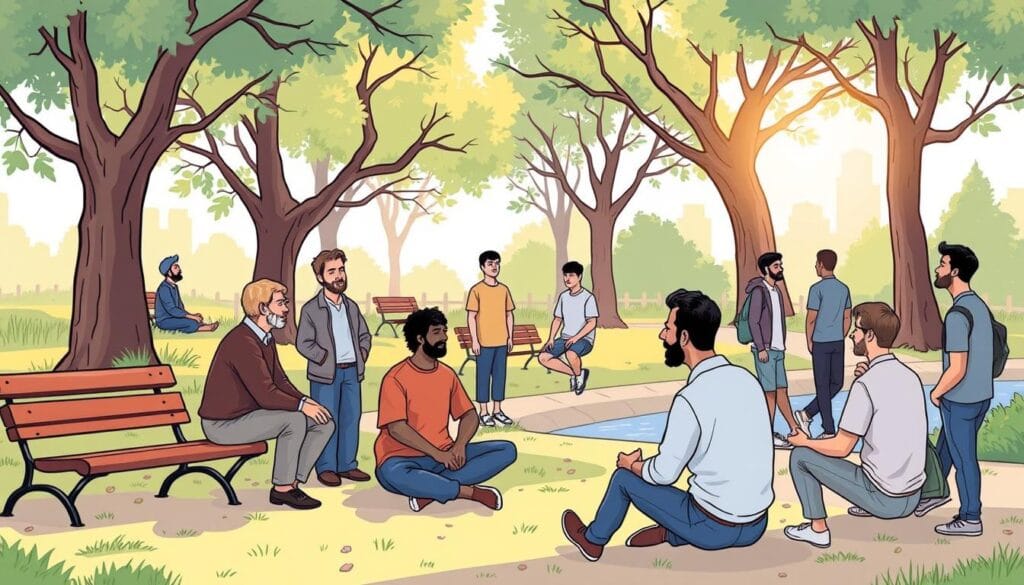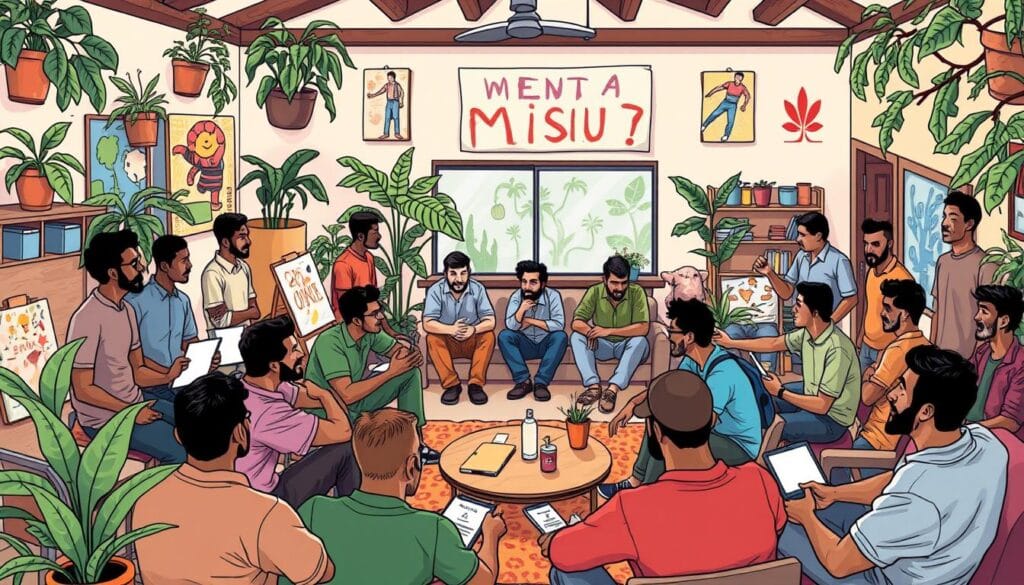Have you ever noticed how men rarely talk about their feelings? It’s not because they don’t feel anything. It’s because society often teaches boys to be “tough” and silent. But this silence can be dangerous.
Men’s mental health statistics tell a powerful story that most people ignore. The numbers are not just numbers; they are real lives at risk. In this blog, we will break down these numbers in simple language, so anyone can understand what’s really going on with men’s mental health.
In this blog, we will explore men’s mental health statistics, why it matters, what the global and Indian numbers show, and what we can do to fix the problem.
Table of Contents
ToggleWhy is Men’s Mental Health an Urgent Public Health Issue Today?
We often talk about physical health. But emotional and mental health? Not so much, especially when it comes to men. The truth is, ignoring mental health leads to bigger problems later.
The Global Burden of Mental Illness in Men
Mental health problems are rising among men everywhere. But most cases go untreated.
- Around 1 in 8 men globally live with a mental disorder.
- Depression and anxiety are the most common mental health disorders in men.
- According to WHO, depression will be the leading cause of disease burden by 2030.
Men suffer silently, and that makes things worse.
Cultural Stigma and Emotional Suppression in Men
Boys are told, “Don’t cry,” or “Be a man.” This creates shame around feelings.
- Many men feel weak or “less manly” if they express emotions.
- This leads to bottling up feelings, which later explode as anger, addiction, or even suicide.
Only about half of men with mental health issues get help, says the Anxiety & Depression Association of America (ADAA). Also, 49% of men hide their depression, and 45% think they can solve mental health problems alone, a Today Show survey found.
Emotional health in men is still not talked about enough.
Read: Manic Depression in Men: Signs and Treatment Options | Dr. Chandril Chugh
Increased Risk of Suicide, Substance Abuse, and Violence
When men don’t get help, the results can be deadly.
- Men are four times more likely to die by suicide than women. Most suicides, 79%, are men.
- Substance abuse is more common in men with mental health issues.
- In countries like India, USA, and Australia, middle-aged and older men are at highest risk.
- In the U.S., 69.38% of all suicides in 2022 were men.
- Violence, both self-directed and toward others, is more likely when emotional pain is ignored.
Men also get schizophrenia more often, with 90% of cases diagnosed by 30 being male. The fear of being seen as weak stops many men from getting help. This makes the problem worse.
These are not small problems. These are life-or-death issues.
The Cost of Untreated Mental Health Disorders
Mental health isn’t just about emotions. It affects jobs, relationships, and even national economies.
- Untreated mental illness in working men leads to lost productivity.
- Mental illness is a growing cause of disability in India and globally.
- Healthcare costs skyrocket when early signs are ignored.
When we avoid the issue, we pay the price, with lives and money.
What Do the Men’s Mental Health Statistics Reveal Globally?
Let’s look at what the world numbers really say about men’s mental health.
How Many Men Suffer from Mental Health Disorders Worldwide?
Mental illness in men is more common than we think.
- According to WHO, over 280 million people suffer from depression globally, and a large portion are men.
- About 6 million men in the U.S. suffer from depression every year.
- Men’s mental health statistics show that anxiety, PTSD, and bipolar disorder are also rising in men.
These numbers prove that mental health in men is not rare. It’s just not talked about.
What Role Does Substance Abuse Play in Men’s Mental Health?
Substance use is a common escape for men in emotional pain.
- Men are twice as likely as women to become dependent on alcohol.
- Drug use is more frequent in men with depression.
- Men’s mental health statistics connect substance abuse directly to suicide and violence.
Men also use marijuana more and have a higher risk of addiction. If they have PTSD, they’re almost twice as likely to have a substance use disorder.
- About 50% of people with severe mental disorders also have substance abuse.
- 45.6 percent of adults with substance use disorder also have mental illness, like depression.
- Suicide rates are almost four times higher for men. 40 percent of these deaths involve alcohol, 30 percent opioids, and 21 percent marijuana.
Substance abuse hides the real pain underneath.
What Age Groups of Men Are Most Affected by Mental Health Challenges?
Men of all ages face mental struggles. But some age groups suffer more.
Are Young Men at Higher Risk of Mental Health Problems?
Yes, very much so.
Young men deal with stress from school and work. They’re trying to grow up. In the U.S., men die by suicide four times more than women. During COVID-19, men reported more depression and thoughts of suicide than women.
- Students and young professionals face stress in studies, jobs, and relationships.
- Men’s mental health statistics show a sharp rise in anxiety and depression among males aged 18-30.
- Social media, peer pressure, and job insecurity make it worse.
Young men are silently struggling.
What About Middle-Aged and Elderly Men?
Don’t forget older men. They are also at risk.
- Men above 45 are more likely to commit suicide.
- Loneliness, retirement, and chronic illness add to the burden.
- Mental illness in working men often goes unnoticed until retirement.
Older men have it even tougher. They deal with aging, health problems, and feeling left out. White men over 85 are at the highest risk of suicide. More men in this age group die by suicide than any other group.
The Impact of Trauma and Adverse Childhood Experiences
Research shows that trauma and adverse childhood experiences (ACEs) deeply affect men’s mental health. Events like physical or sexual abuse, neglect, or violence can lead to mental health issues. These include post-traumatic stress disorder (PTSD), depression, and substance abuse.
About two-thirds of U.S. adults have had at least one ACE in childhood. One in six adults have faced four or more ACEs. This means they have been exposed to many traumatic events.
- Some groups face more ACEs, like women, young adults, and those with lower income.
- Emotional abuse is the most common ACE. It’s followed by parental separation and household substance abuse.
The effects of trauma and ACEs on men’s mental health are huge. Studies show they increase the risk of depression, anxiety, and suicidal thoughts. ACEs also lead to chronic health problems and substance abuse.
Read: Best Multivitamin for Men: How to Choose the Right One for Your Health

It’s key to understand how trauma and ACEs affect men’s mental health. We need to address these issues and help men build resilience. This way, we can help them deal with the lasting effects and improve their well-being.
What are the Mental Health Statistics for Men in India?
India is facing its own mental health crisis, especially among men.
How Common Are Mental Health Issues in Indian Men?
The numbers in India are alarming but often hidden.
- The National Mental Health Survey 2015-16 reported that nearly 13.7% of Indians suffer from mental illness.
- Mental health issues in Indian men often go undiagnosed.
- Depression in Indian males is rising, especially in urban areas.
The problem is bigger than we think.
What Are the Leading Mental Health Conditions Affecting Indian Men?
Some issues hit harder in Indian men.
- Alcohol Use Disorder is the top concern.
- Depression, schizophrenia, and anxiety are also major issues.
- In states like Kerala, Punjab, and Delhi, mental illness rates in men are higher than national average.
Men and depression statistics in India show a steady rise.
How is Mental Health a Leading Cause of Disability in India?
Mental illness doesn’t just affect emotions. It affects daily life.
- Mental disorders are among the top 10 causes of DALYs in India.
- Depression and anxiety are major causes of lost working years in men.
- Mental illness disability India figures are climbing every year.
This is not just a health issue; it’s a national concern.
By changing what we mean by strength and masculinity, we can help men care for their mental health. This benefits not just men but our whole community.
How Does Society Influence Men’s Mental Health?
The way society treats men affects how they handle emotions.
What Role Does Toxic Masculinity and Stigma Play?
Society sets tough rules for men.
- Many men avoid therapy due to fear of judgment.
- The stigma around men’s mental health stops them from asking for help.
- Emotional vulnerability is wrongly seen as a weakness.
We need to break this mindset.
How Does Employment and Financial Pressure Impact Mental Health?
Money problems hit men hard.
- Unemployment and job loss are linked to depression.
- Work pressure leads to stress in men.
- A mental health India report showed 60% of men face stress due to job insecurity.
Mental health in men is directly affected by income issues.
How Many Men Seek Help for Their Mental Health Conditions?
Sadly, not many.
What Is the Treatment Gap in Men’s Mental Health?
There is a wide gap between those who need help and those who get it.
- In India, 70-80% of people with mental illness don’t receive any treatment.
- The treatment gap in mental health is higher in men due to stigma and denial.
- Many believe therapy is “not for men.”
This myth is dangerous.
How Effective Are Mental Health Interventions for Men?
The good news is, help works.
- CBT (Cognitive Behavioral Therapy) has helped thousands of men.
- Group therapy and tele-mental health programs are growing.
- Government and private hospitals now offer therapy for men through online portals.
The results are promising, if men take the first step.
Improving Access to Mental Health Resources for Men
Men often face big challenges when trying to get mental health help. Stigma, lack of awareness, and services not made for men are big hurdles. It’s key to make mental health care better for men to improve their health.
Stigma is a big problem, especially for men who feel they must be tough. Men are less likely to get help because of this. They might turn to alcohol or drugs instead. We need to change these harmful ideas and support men’s mental health.
Many men don’t know about mental health resources or feel they don’t fit. [Data] shows women get more help than men. We need to reach out more and offer services made for men.

To help men get better mental health care, we need many steps. This includes:
- Starting campaigns to reduce stigma and encourage men to get help
- Creating more mental health services for men
- Training doctors to spot and help men’s mental health issues
- Working with community groups and places of worship to reach men
- Offering affordable, easy-to-use mental health resources like online groups
By working to remove barriers and make help easier to get, we can help men focus on their well-being. This is important for men’s health and for our communities’ strength.
The Role of Healthcare Providers in Supporting Men’s Mental Health
Healthcare providers are key in helping men with their mental health. They do this by doing regular mental health checks and starting treatment early. This helps men feel less ashamed to talk about their feelings.
Checking for mental health issues during regular visits is important. It helps find problems like depression and anxiety early. Healthcare providers can make a safe space for men to talk about their feelings. This way, men can get the help they need.
- Incorporate mental health screening as a standard practice during routine check-ups and wellness visits.
- Provide referrals to mental health professionals and ensure seamless coordination of care.
- Foster an environment of trust and understanding, where men feel comfortable discussing their emotional health.
- Educate patients on the importance of proactive mental health management and the availability of various treatment options.
Starting treatment early is very important for men’s mental health. Healthcare providers need to understand the challenges men face. This includes the pressure to be tough and not show emotions.
By supporting men’s mental health, healthcare providers can make a big difference. They can help men feel more comfortable getting help. This can greatly improve men’s health in the long run.
Community-Based Approaches to Promoting Men’s Mental Health
Community-based programs are great for supporting men’s mental health. They use local efforts to help men get the help they need. These programs create safe places for men to talk and support each other.
Peer support groups are a good example. They let men share their stories and learn from each other. Studies show these groups help men’s mental health and get them to seek help.
- Education campaigns in the community also work well. They use messages that men can relate to. This helps men feel okay talking about their mental health.
- Initiatives that meet the needs of men in certain groups are also effective. For example, programs for men at work or in sports teams can reach them where they are.
Using community-based methods to support men’s mental health is powerful. It builds a network that helps men take care of themselves. This approach can really change the way men think about their mental health, leading to better lives for everyone.

The Intersection of Men’s Mental Health and Physical Health
The link between men’s mental and physical health is very important. Your physical health can greatly affect your mental health, and the other way around. It’s key to work on both for better health.
Issues like chronic conditions or a bad diet can hurt your mental state. Feeling stressed or anxious can also show up in your body. This means you might feel tired or have pain.
It’s important to take care of both your mind and body. This way, you can improve your health and life quality. You might need to see doctors for both physical and mental health. Also, making healthy lifestyle choices is helpful.
Remember, your mental and physical health are connected. Taking care of one can help the other. By focusing on your overall health, you can make yourself happier and healthier.
Why Every Man’s Mental Health Deserves Attention Today?
Ignoring men’s mental health has led to a silent crisis. Men’s mental health statistics prove this. From depression to suicide to substance abuse, the numbers show men are suffering in silence. We must act before it’s too late.
If you or someone you know is facing emotional distress, don’t wait. Book a consultation with Dr. Chandril Chugh today and take the first step toward recovery.
FAQ
What are the unique mental health challenges that men often face?
Men often deal with substance abuse and higher suicide rates. Yet, they are less likely to seek help due to societal stigma and masculinity expectations.
How do the mental health conditions of men differ from women?
Women are more likely to face anxiety and depression. But men also struggle with these issues. They are less likely to get help than women.
What are the societal barriers that prevent men from addressing their mental health?
Traditional gender norms and expectations of masculinity can stop men from seeking help. This “tough guy” mentality makes it hard for them to talk about their feelings.
How do men’s mental health challenges vary across different age groups?
Men’s mental health issues change with age. Young men face stress from school and work. Middle-aged men deal with work-life balance. Older men see the effects of aging on their mental health.
What is the connection between mental health issues and substance abuse in men?
There’s a strong link between mental health and substance abuse in men. They are more likely to struggle with alcohol and drug addiction. This can hide underlying mental health problems.
How do traumatic experiences impact men’s mental health?
Trauma and adverse childhood experiences deeply affect men’s mental health. Events like abuse or neglect can lead to PTSD, depression, and addiction.
How can redefining masculinity help address men’s mental health challenges?
Changing what it means to be strong and masculine is key. It should include emotional awareness, vulnerability, and self-care. This encourages men to care for their mental health.
What are the barriers to accessing mental health resources for men?
Men face many barriers to mental health resources. Stigma, lack of awareness, and few male-friendly services are big issues. Making support more accessible and tailored to men’s needs is vital.
What is the role of healthcare providers in supporting men’s mental health?
Healthcare providers are crucial in supporting men’s mental health. They should do routine screenings, intervene early, and create a safe space for men to talk about their feelings. This helps break down stigma and barriers.
How can community-based initiatives help promote mental health awareness and support for men?
Community programs and initiatives are effective. They include peer support groups, education campaigns, and community-driven interventions. These address the unique needs and cultural factors affecting men’s mental health.
What is the relationship between men’s mental and physical health?
Poor physical health, injuries, or unhealthy lifestyle choices can harm a man’s mental well-being. A holistic approach that considers overall health is key for better outcomes.
Source Links
About The Author

Medically reviewed by Dr. Chandril Chugh, MD, DM (Neurology)
Dr. Chandril Chugh is a U.S.-trained, board-certified neurologist with expertise in diagnosing and managing neurological disorders, including migraines, epilepsy, Parkinson’s disease, and movement disorders. His clinical focus includes evidence-based neurological care and patient education.
All content is reviewed for medical accuracy and aligned with current neurological guidelines.




